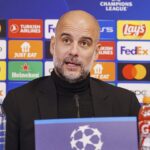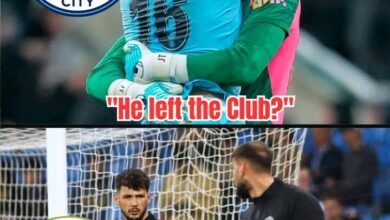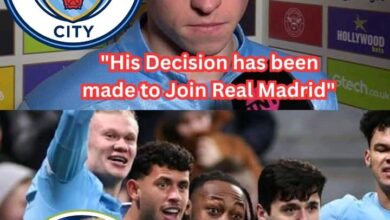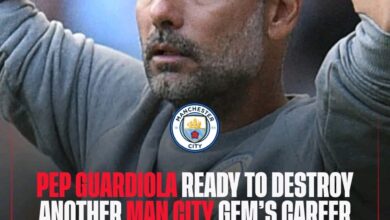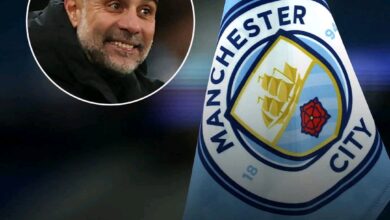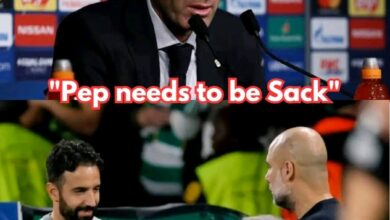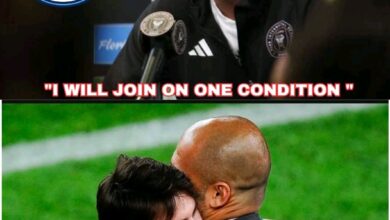Shock Premier League transfer could be a golden opportunity for Manchester City
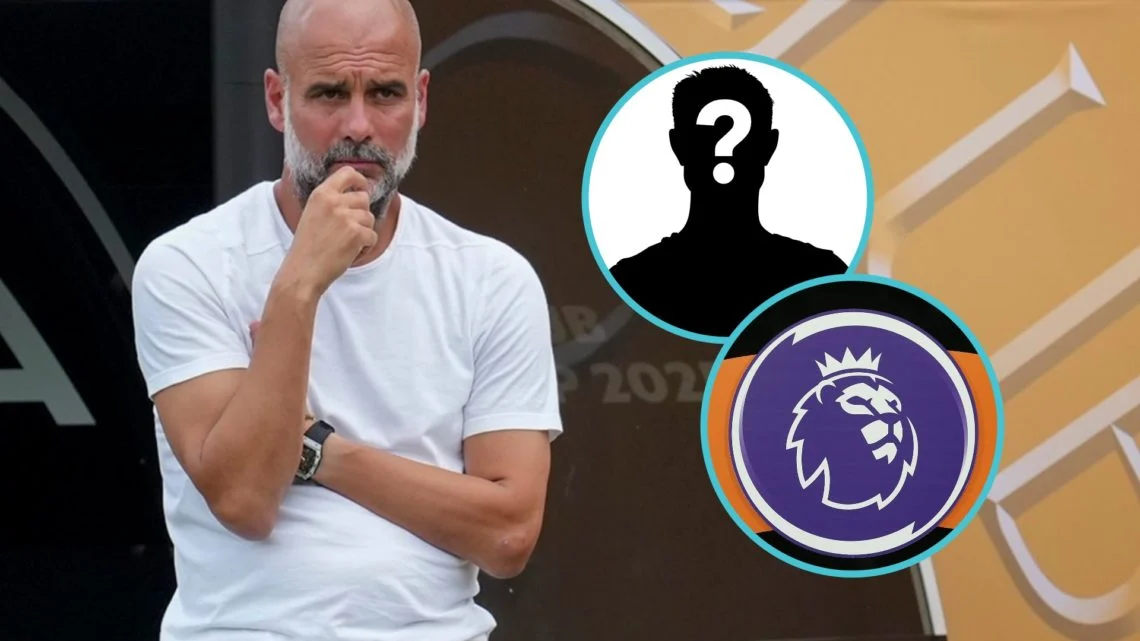
The summer transfer window of 2025 has been a period of significant transformation for Manchester City, as Pep Guardiola embarks on an ambitious rebuilding project following what can only be described as a catastrophic previous campaign. While the Citizens have already made substantial moves in the market, the emergence of an unexpected opportunity could provide the perfect solution to one of their most persistent transfer headaches.
Manchester City’s approach to the current transfer window reflects the urgency of their situation. After a season that fell far short of their astronomical standards, Guardiola has wasted no time in reshaping his squad for the challenges ahead. The acquisition of Tijjani Reijnders and Rayan Cherki has already sent ripples of excitement through the fanbase, with both players expected to inject fresh creativity and dynamism into City’s attacking play.
The Dutch midfielder Reijnders, who caught the eye with his performances at AC Milan, brings a unique blend of technical ability and tactical intelligence that perfectly aligns with Guardiola’s philosophical approach to the game. His vision and passing range make him an ideal candidate to fill the creative void that has plagued City in recent months. Meanwhile, Cherki’s arrival from Lyon represents a calculated gamble on raw talent, with the young Frenchman possessing the kind of mercurial ability that can unlock the most stubborn of defensive setups.
The signing of left-back Rayan Ait-Nouri has also proven to be an inspired piece of business. The Wolverhampton Wanderers defender has already begun to forge what appears to be a telepathic understanding with Jeremy Doku on the left flank. Their burgeoning partnership promises to add a new dimension to City’s attacking play, with Ait-Nouri’s overlapping runs providing the perfect complement to Doku’s tendency to drift infield and create havoc in central areas.
While pre-season results should always be taken with a grain of salt, City’s performances in the Club World Cup have provided genuine cause for optimism among supporters who endured the disappointment of the previous campaign. Three victories in the group stage have not only demonstrated the team’s improved cohesion but have also added a welcome £10 million to the club’s coffers, money that could prove crucial in funding further additions to the squad.
The evidence of Guardiola’s tactical adjustments is already becoming apparent. The team’s pressing intensity has returned to levels reminiscent of their most successful periods, while the integration of new signings has been remarkably smooth. This early success, however, comes with the caveat that these matches are essentially glorified friendlies, but the signs are undeniably encouraging for what lies ahead.
Despite the positive early indicators, Guardiola remains committed to his belief that a smaller, more focused squad is the key to sustained success. This philosophy, while perhaps counterintuitive in an era of packed fixture lists and injury concerns, reflects the Catalan coach’s preference for working with a tight-knit group of players who can seamlessly adapt to multiple roles within his system.
However, this approach has not met with universal approval within the squad. Bernardo Silva, one of City’s most influential players, has reportedly expressed reservations about the wisdom of reducing squad size. The Portuguese midfielder’s concerns are understandable, given the physical demands of modern football and the increased risk of burnout that comes with a limited pool of players. Nevertheless, Guardiola’s track record suggests that his tactical acumen often compensates for any numerical disadvantages.
The pursuit of a streamlined squad inevitably means that some current players will have to seek opportunities elsewhere. The departure of Kevin De Bruyne, announced in characteristically emotional fashion, marks the end of an era for Manchester City. The Belgian maestro’s contribution to the club’s success over recent years cannot be overstated, and his absence will undoubtedly be felt both on and off the pitch.
Equally significant is the anticipated exit of Jack Grealish, whose Manchester City career has never quite reached the heights that his substantial transfer fee suggested it might. The England international’s departure appears to be a foregone conclusion, with various clubs reportedly interested in securing his services. While Grealish undoubtedly possesses exceptional talent, his style of play has sometimes seemed at odds with Guardiola’s systematic approach, making a parting of ways perhaps inevitable.
Among the players that City are eager to move on, few cases are as complex as that of Kalvin Phillips. The midfielder’s journey from England international to Manchester City outcast represents one of the most dramatic falls from grace in recent Premier League history. His £45 million transfer from Leeds United was supposed to provide City with the defensive midfielder they had long sought, but the reality has been starkly different.
Phillips’ time at the Etihad has been characterized by limited opportunities, inconsistent performances, and a gradual erosion of confidence that has affected every aspect of his game. The player who once marshaled England’s midfield at a European Championship final has struggled to adapt to the specific demands of Guardiola’s system, finding himself increasingly marginalized as other players have stepped up to fill similar roles.
The financial implications of Phillips’ unsuccessful stint at City cannot be ignored. With his contract running until 2028 and his market value having plummeted from his peak valuation, the club faces the prospect of taking a significant loss on their investment. This situation is complicated further by Phillips’ current injury status, which severely limits his attractiveness to potential suitors.
The recent developments surrounding Leeds United’s transfer activities may have inadvertently created the perfect opportunity for City to resolve the Phillips situation. Leeds’ return to the Premier League has necessitated significant squad reinforcement, with manager Daniel Farke identifying midfield as a priority area for improvement.
The Yorkshire club appeared to be closing in on Strasbourg midfielder Habib Diarra, a player whose performances for both club and country had attracted attention from across Europe. The Senegalese international’s impressive showing against England in June had only enhanced his reputation, making him an attractive proposition for clubs looking to add quality to their midfield departments.
However, in a dramatic turn of events, fellow newly-promoted side Sunderland have swooped in to hijack the deal. Fabrizio Romano’s confirmation of Sunderland’s successful bid worth €31.5 million plus €4 million in add-ons represents a significant coup for the Black Cats but leaves Leeds scrambling for alternatives.
This unexpected development could prove to be the catalyst that facilitates Phillips’ return to Elland Road. The emotional connection between the player and his boyhood club cannot be understated. Phillips rose through Leeds’ academy system, becoming a local hero during their promotion back to the Premier League and subsequent top-flight campaigns.
The prospect of returning to familiar surroundings, working under a coach who understands his strengths, and playing for supporters who genuinely appreciate his qualities could be exactly what Phillips needs to rediscover his best form. For Leeds, signing a player of Phillips’ international pedigree, despite his recent struggles, would represent a statement of intent as they prepare for life back in the Premier League.
From a tactical perspective, Phillips’ attributes align well with what Leeds require. His energy, pressing ability, and knack for breaking up play could prove invaluable in helping the club avoid an immediate return to the Championship. While his recent performances have been disappointing, his underlying qualities remain intact, and a change of environment could be the catalyst for a renaissance.
However, any potential deal faces a significant obstacle in the form of Phillips’ current injury status. Reports from May indicated that the midfielder underwent surgery to address an Achilles problem, with the recovery period expected to keep him sidelined until August. This timing is particularly problematic, as it means Phillips will miss the crucial pre-season period when new signings typically integrate with their teammates and adapt to tactical systems.
For any club considering a move for Phillips, his inability to participate in pre-season training represents a substantial risk. The lack of match fitness and tactical preparation could significantly delay his potential impact, making him a less attractive proposition despite his obvious qualities. This situation is particularly challenging for Leeds, who need immediate contributions from new signings as they prepare for the rigors of Premier League football.
The financial aspects of any potential Phillips transfer are complex and multifaceted. Manchester City’s initial investment of £45 million now appears vastly inflated based on the player’s subsequent performances and current market position. The club’s ability to recoup even a fraction of this fee depends largely on finding a buyer willing to overlook recent disappointments in favor of Phillips’ proven international credentials.
Leeds United’s financial position as a newly-promoted club adds another layer of complexity to any potential deal. While their return to the Premier League provides access to significantly increased revenue streams, they must still operate within the constraints of Financial Fair Play regulations. The club’s transfer strategy will need to balance ambition with fiscal responsibility, making expensive signings difficult to justify without clear evidence of potential returns.
The structure of any potential deal would likely need to be creative to satisfy all parties involved. Manchester City might need to accept a heavily subsidized loan arrangement or a permanent transfer at a significantly reduced fee. Meanwhile, Leeds would need assurance that Phillips’ injury recovery proceeds smoothly and that he can rediscover the form that made him such an integral part of England’s recent international campaigns.
From a tactical standpoint, Phillips’ potential return to Leeds would represent more than just a nostalgic homecoming. The midfielder’s understanding of the club’s playing style, developed during his formative years and perfected during their recent top-flight campaigns, could prove invaluable as Farke implements his own tactical philosophy.
Phillips’ natural game revolves around his exceptional work rate, intelligent positioning, and ability to initiate attacks from deep positions. These qualities made him such an effective player for both Leeds and England, and they remain relevant despite his struggles at Manchester City. The key difference would be the tactical context in which these attributes are deployed.
At Leeds, Phillips would likely operate with greater freedom and responsibility, roles that have historically brought out his best performances. The contrast with his situation at City, where he struggled to adapt to the specific positional requirements of Guardiola’s system, could not be more stark. This change of environment and tactical responsibility might be exactly what Phillips needs to rediscover his confidence and effectiveness
Phillips’ situation is emblematic of broader trends in modern football transfers. The increasing financial stakes involved in player acquisitions have made unsuccessful signings more costly than ever before, while the competitive nature of elite football leaves little room for extended periods of adaptation or development.
Manchester City’s experience with Phillips serves as a reminder that even the most successful clubs can make significant misjudgments in the transfer market. The midfielder’s struggles highlight the importance of ensuring tactical and cultural fit, rather than simply acquiring talented players and expecting them to adapt automatically to new environments.
For Leeds United, the potential acquisition of Phillips represents both an opportunity and a risk. On one hand, they would be gaining a player with proven Premier League experience and international credentials. On the other hand, they would be gambling on their ability to restore a player whose confidence and form have been severely compromised by his experiences elsewhere.
As the transfer window progresses, the resolution of Phillips’ situation will likely become increasingly important for all parties involved. Manchester City’s desire to streamline their squad means that finding a solution for players like Phillips is essential to their broader transfer strategy. The funds generated from player sales could be crucial in funding additional acquisitions or simply in balancing the books after a period of significant expenditure.
For Phillips himself, the next few weeks could prove pivotal in determining the trajectory of his career. At 29, he still has several productive years ahead of him, but his recent experiences suggest that finding the right environment and tactical setup will be crucial to maximizing his potential. A return to Leeds could provide the perfect platform for a career renaissance, but only if both club and player are fully committed to making the arrangement work.
The emotional aspects of a potential homecoming should not be underestimated. Phillips’ connection to Leeds United runs deep, forged through years of development in their academy system and cemented by his role in the club’s recent resurgence. This emotional bond could prove to be the deciding factor in any potential transfer, providing motivation for both player and club to make the necessary compromises
The unexpected developments in Leeds United’s pursuit of Habib Diarra have created a fascinating subplot in what is already proving to be an eventful transfer window. For Manchester City, the opportunity to resolve the Kalvin Phillips situation could prove to be one of the most significant outcomes of their summer business, even if it involves accepting a substantial financial loss.
The success or failure of any potential deal will ultimately depend on the willingness of all parties to compromise and their shared belief in Phillips’ ability to rediscover his best form. While the midfielder’s recent struggles and current injury status represent significant obstacles, the emotional pull of a homecoming and the tactical suitability of a return to familiar surroundings could provide the perfect conditions for a remarkable career revival.
As Pep Guardiola continues his squad reconstruction and Leeds United prepare for their Premier League return, the resolution of the Phillips situation may prove to be a defining moment for both clubs. The coming weeks will reveal whether this unexpected opportunity can indeed prove to be the golden chance that all parties are hoping for.





